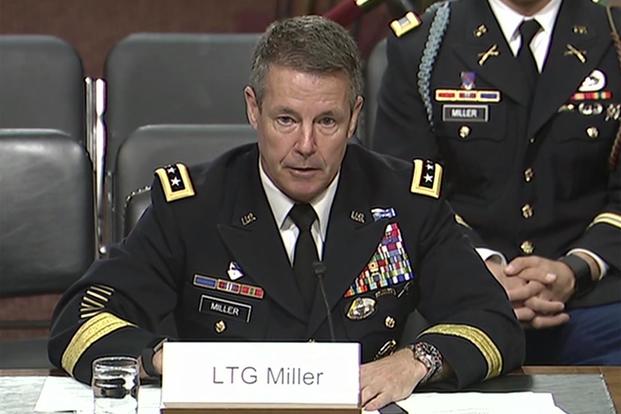Army Lt. Gen. Austin S. "Scott" Miller gestured over his shoulder Tuesday to his son, Army 2nd Lt. Austin Miller of the 82nd Airborne Division, to emphasize just how long the U.S. has been fighting the "generational" war in Afghanistan.
As a lieutenant colonel, Miller went to Afghanistan for the first time shortly after the Sept. 11, 2001, terror attacks.
"This young guy sitting behind me -- I never anticipated that his cohort would be in a position to deploy [to Afghanistan] as I sat there in 2001 and looked at this," Miller said.
"I cannot guarantee you a timeline or an end date" for when the estimated 16,000 U.S. troops now in Afghanistan would be able to withdraw, Miller said at his Senate confirmation hearing to become the ninth commander of U.S. and NATO forces since the 9/11 attacks.
Under questioning by the Senate Armed Services Committee, Miller, who is expected to receive a fourth star upon confirmation, repeatedly fell back on the overriding need to protect the U.S. against another major terrorist attack to justify the continuing U.S. presence in Afghanistan.
"I've learned a lot in the last 17 years," said Miller, currently commander of Joint Special Operations Command. "I've learned there are groups that want nothing more than to harm Americans."
"I've learned," he continued, "these groups thrive in ungoverned spaces. I've also learned that when we maintain pressure on them abroad, they struggle to organize and build the necessary means to attack us."
Miller added that he thought military pressure was required to bring about the political reconciliation between the struggling central government in Kabul and the Taliban.
"I know this is having an effect on elements that would attack us," Miller said. "This is about protecting U.S. citizens, when you go right to the heart of the issue."
Miller's brief outline of his goals in succeeding Army Gen. John Nicholson as overall commander later this summer was met with varying degrees of skepticism from both sides of the aisle during the hearing.
Sen. Elizabeth Warren, D-Massachusetts, cited a long list of generals and Defense Secretaries who had previously come before the Committee to speak of having "turned the corner" in the war in Afghanistan in terms of the progress being made.
"We supposedly have turned the corner so many times that it seems we're going in circles," Warren said. "Unfortunately you are not the first commander to come in here to express cautious optimism. After 17 years of war, what are you going to do differently?"
Miller said he would first have to get on the ground in Afghanistan to make an assessment, but he pledged that he would not speak of turning a corner "unless there is one."
Miller did not dispute Warren's assessment that Afghanistan was still "in crisis" amid rampant political corruption and widespread drug trafficking, coupled with "unsustainable" losses by the Afghan security forces and steady gains of territory by the Taliban.
According to the Pentagon, about two-thirds of Afghanistan's population remains in areas under Afghan government control and the rest lives in areas that are either contested or held by the Taliban.
Miller said that the core problems of Afghan governance would have to be addressed while maintaining military pressure to meet the U.S. objective of forcing the Taliban into negotiating for a political settlement.
Miller also warned that a "precipitous and disorderly withdrawal" would result in negative outcomes for U.S. national security.
He said that without more training and advising for Afghan security forces, ISIS and al-Qaida could even rise as terror threats to the U.S. itself.
"What does winning look like?" Sen. Lindsey Graham, R-South Carolina, asked Miller.
Miller responded that it was a stable Afghan government and a "hardened" Afghan military able to prevent territory from being used as "safe havens" for terrorist attack.
When Graham asked if the situation in Afghanistan were "getting better or worse," Miller said he didn't know, fully.
"I'm not able to judge the better or worse at this stage," he said.
Sen. Tom Cotton, R-Arkansas, referred again to Miller's son, Lt. Austin Miller, to make the point that the U.S. must remain engaged in lengthy wars to protect the homeland.
Cotton noted the possibility that Lt. Miller would have a young private report to his platoon next year who was born after the 9/11 attacks.
"That's a pretty shocking fact, isn't it?" Cotton said.
Miller agreed, but added that "I go back to that national interest, that vital national interest" to prevent another attack on the homeland.
"That's why we're in Afghanistan," he said.
Cotton asked whether Miller could have imagined in 2001 that he would be deploying again to Afghanistan in 2018.
"Senator, I did not," Miller responded.
"I recall conversations with people who were out for Christmas in 2001," Miller said of his deployment to Afghanistan that year. "[They were] talking about how they were doing this so their kids did not have to."
Miller, a 1983 graduate of West Point from Hawaii, said he was bringing to Afghanistan years of experience in ground combat but would have to get updated on the air war and the status of the Afghan Air Force.
He was among the first U.S. troops to enter Afghanistan after the 9/11 attacks of 2001. He returned to Afghanistan in 2010 in charge of training and equipping local forces and police, and in June 2013 was in Afghanistan in command of Special Operations in the country.
His awards include the Distinguished Service Medal, the Defense Superior Service medal, the Legion of Merit, the Bronze Star with combat 'V' device and two oak leaf clusters, and the Purple Heart with oak leaf cluster.
Miller was wounded as a Delta Force captain in the 1993 "Black Hawk Down" battle of Mogadishu, and again in Iraq in 2003.
-- Richard Sisk can be reached at Richard.Sisk@Military.com.













